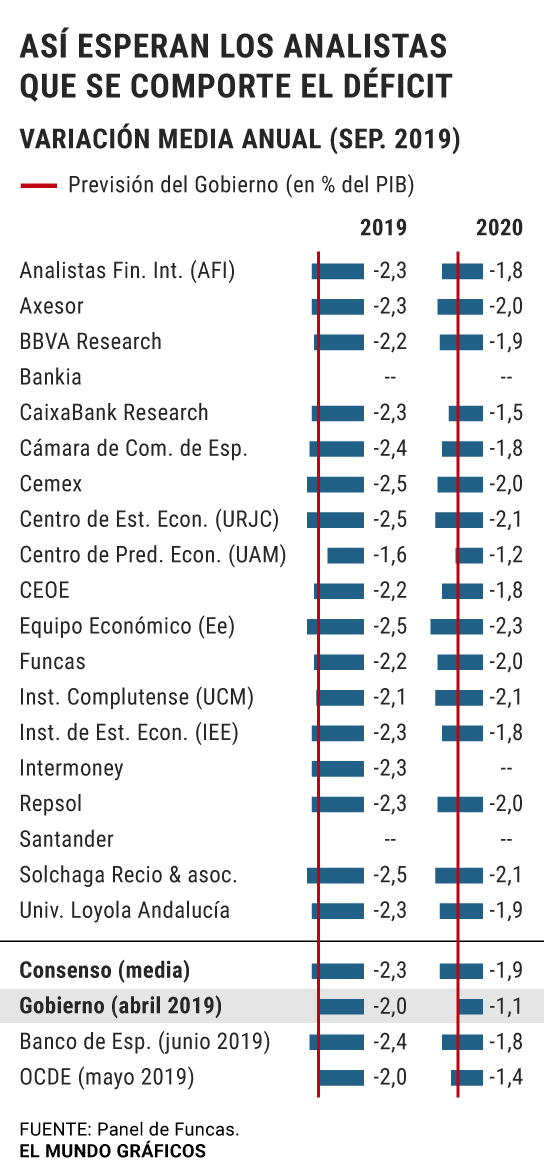The Bank of Spain and 16 of the main study services in the country bet that the State will not be able to reduce the deficit this year or to the softened objective set by the Government in functions, equivalent to 2% of the Gross Domestic Product.
The Bank of Spain finalizes its report on macroeconomic projections and does not detect for now data that make it believe that the 2% objective will be met, according to sources close to the institution. Its last official forecast last June is 2.4% and the review that the National Institute of Statistics makes of the evolution of GDP further complicates the goal . In fact, this change of the INE caused yesterday that the Bank of Spain postponed on the 24th the presentation of its new forecasts, which also allow the organism not to appear in the public debate with downward forecasts in full outcome of the legislature.
For its part, the Foundation of Savings Banks (Funcas) released on Monday an update of forecasts of 17 of the main study services of the country and only one that believes that the State will substantially reduce the deficit this year . From CaixaBank to BBVA to CEOE or Funcas itself, they believe that the State will not be able to reach the bar. Especially pessimistic is the office of former socialist minister Carlos Solchaga , which places it at 2.5%, as in 2018. The exception is the Economic Prediction Center of the Autonomous University of Madrid, which is committed to a demanding 1.6 % of GDP at the end of the year. In the institution they assure this newspaper that there are reasons for collection and control of spending that invite this optimism, although they assure that they will follow the evolution in this last quarter of the year in case they should correct their prediction.
What does not create any study service in Spain so far is the goal of deficit set by the Government for 2020 of 1.1% of GDP . The consensus of economists is that it will not fall from 1.9% in another year lost to complete the cleaning up of public accounts, necessary in case of a new international crisis.
For its part, the Independent Authority for Fiscal Responsibility (AIReF) does not predict for now a strict compliance with the deficit objective, although it did point out last week that it is "feasible", which in its jargon means a certain confidence of compliance. According to their latest report, the autonomous communities constitute the main risk of diversion this year increased by the refusal of the Government in functions to unlock more than 9,000 million that they planned to receive from the State. The municipalities are not going to register as much surplus as other years to compensate deviations from the rest.
As for the objective of public debt, the Minister of Economy in functions, Nadia Calviño , yesterday released a statement in which she assures that the July data announced yesterday, which brings the indebtedness of the State to 97.6% of GDP, «is compatible »with its forecast to end the year at 95.8% .
The acting President of the Government , Pedro Sánchez , highlighted yesterday in his letter to the leader of Citizens, Albert Rivera , his commitment to "fulfill our commitments of budgetary stability and economic growth agreed with the European Union."
But there is no agreed commitment with the EU to lower the deficit to 2%. It was the Government itself that decided to impose lowering the deficit in 2019 to that bar after verifying that the 1.8% that had been marked after the PSOE came to power in 2018 was not possible . Theoretically, the legal objective that should be met This year is down to 1.3%, since PP and Citizens blocked in the previous legislature the attempt to soften the government.
In the last recommendation of the European Council to Spain last July, Sánchez was reminded that the reduction of the nominal deficit should be accompanied by a real one. It must achieve a structural adjustment of 0.65% (7,800 million regardless of the economic boom) this year and also in 2020 and, nevertheless, a "significant deviation risk" is seen . The Government's own forecast for updating the stability program after the elections is that in 2019 there will not only be no structural adjustment - regardless of the economic cycle - but deterioration in this indicator, although they believe that there will be an improvement in 2020.
According to the criteria of The Trust Project
Know more- GDP
- Spain
- Citizens
- European Union
- Pedro Sanchez
- PSOE
- PP
- Albert rivera
- CEOE
- Nadia Calviño
Energy The attack on the Saudi refinery, another threat to the trade balance and the drivers pocket
Macroeconomics The Government's suffocation of the Autonomous Communities triggers its delinquency with suppliers by 13.6%
Interview Antonio Bonet: "Our competitiveness gain is based on the salary reduction and is not sustainable"

